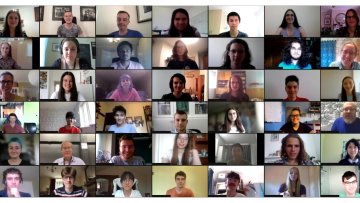16:00
A gentle introduction to 1+1d noninvertible symmetries and gapped phases
Note: ONLY virtual on Teams.
16:00
G2 instantons in twisted M-theory
It is also possible to join online via Zoom.
Abstract
Computing Donaldson-Thomas partition function of a G2 manifold has been a long standing problem. The key step for the problem is to understand the G2 instanton moduli space. I will discuss a string theory way to study the G2 instanton moduli space and explain how to compute the instanton partition function for a certain G2 manifold. An important insight comes from the twisted M-theory on the G2 manifold. This talk is based on a work with Michele del Zotto and Yehao Zhou.
14:00
The n-queens problem
Abstract
The $n$-queens problem asks how many ways there are to place $n$ queens on an $n \times n$ chessboard so that no two queens can attack one another, and the toroidal $n$-queens problem asks the same question where the board is considered on the surface of a torus. Let $Q(n)$ denote the number of $n$-queens configurations on the classical board and $T(n)$ the number of toroidal $n$-queens configurations. The toroidal problem was first studied in 1918 by Pólya who showed that $T(n)>0$ if and only if $n \equiv 1,5 \mod 6$. Much more recently Luria showed that $T(n)\leq ((1+o(1))ne^{-3})^n$ and conjectured equality when $n \equiv 1,5 \mod 6$. We prove this conjecture, prior to which no non-trivial lower bounds were known to hold for all (sufficiently large) $n \equiv 1,5 \mod 6$. We also show that $Q(n)\geq((1+o(1))ne^{-3})^n$ for all $n \in \mathbb{N}$ which was independently proved by Luria and Simkin and, combined with our toroidal result, completely settles a conjecture of Rivin, Vardi and Zimmerman regarding both $Q(n)$ and $T(n)$.
In this talk we'll discuss our methods used to prove these results. A crucial element of this is translating the problem to one of counting matchings in a $4$-partite $4$-uniform hypergraph. Our strategy combines a random greedy algorithm to count `almost' configurations with a complex absorbing strategy that uses ideas from the methods of randomised algebraic construction and iterative absorption.
This is joint work with Peter Keevash.
On C*-Rigidity for a Certain Class of Bieberbach Groups
Abstract
Here we present the findings of our summer research project: an 8-week investigation of C*-Algebras. Our aim was to explore when a group is uniquely determined by its reduced group C*-algebra; i.e. when the group is C*-rigid. In particular, we applied techniques from topology, algebra, and analysis to prove C*-rigidity for a certain class of Bieberbach groups.
Critical exponents for a three-dimensional percolation model
Abstract
We will report on recent progress regarding the near-critical behavior of certain statistical physics models in dimension 3. Our results deal with the second-order phase transition associated to two percolation problems involving the Gaussian free field in 3D. In one case, they determine a unique ``fixed point'' corresponding to the transition, which is proved to obey one of several scaling relations. Such laws are classically conjectured to hold by physicists on the grounds of a corresponding scaling ansatz.
PROMYS Europe Connect 2021 saw a group of enthusiastic and high-achieving young mathematicians gather (online) in July and August for a four-week intensive summer programme designed to give them the experience of thinking deeply about mathematics in a community of similarly mathematically excited students and staff. In other circumstances, PROMYS Europe is a six-week residential programme in Oxford, organised by a partnership of PROMYS (Boston), Wadham College and the Mathematical Institute at the University of Oxford, and the Clay Mathematics Institute.
Existential rank and essential dimension of definable sets
Abstract
Several natural measures of complexity can be attached to an
existentially definable ("diophantine") subset of a field. One of these
is the minimal number of existential quantifiers required to define it,
while others are of a more geometric nature. I shall define these
measures and discuss interesting interactions and behaviours, some of
which depend on properties of the field (e.g. imperfection and
ampleness). We shall see for instance that the set of n-tuples of field
elements consisting of n squares is usually definable with a single
quantifier, but not always. I will also discuss connections with
Hilbert's 10th Problem and a number of open questions.
This is joint work with Nicolas Daans and Arno Fehm.


